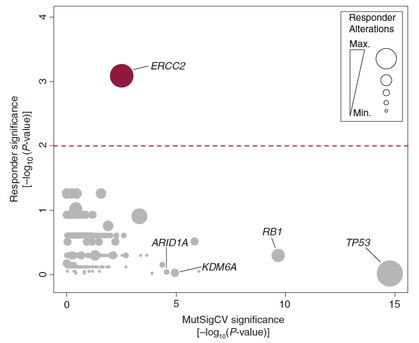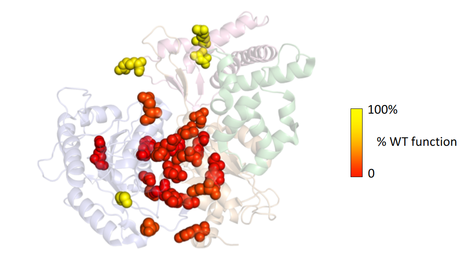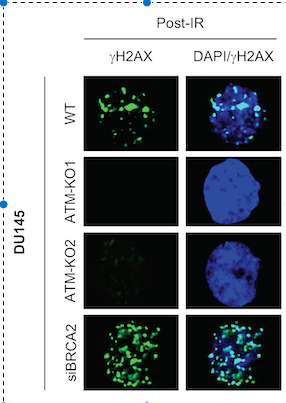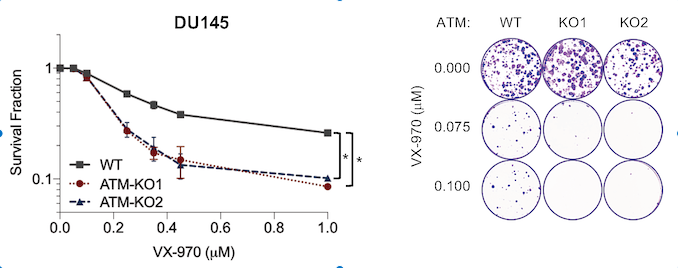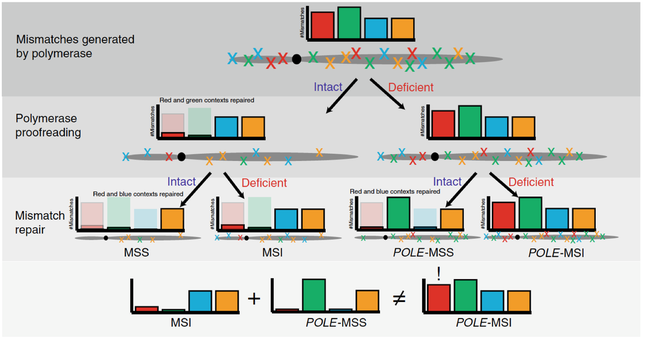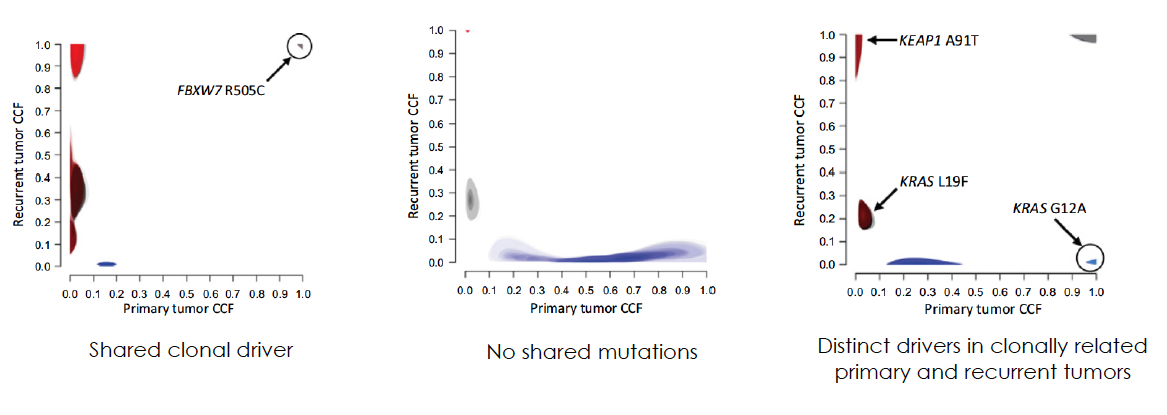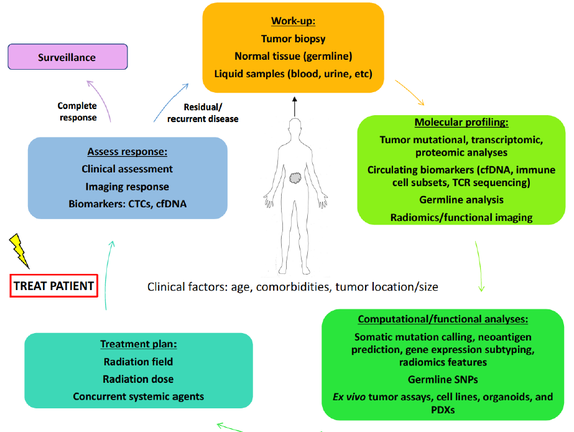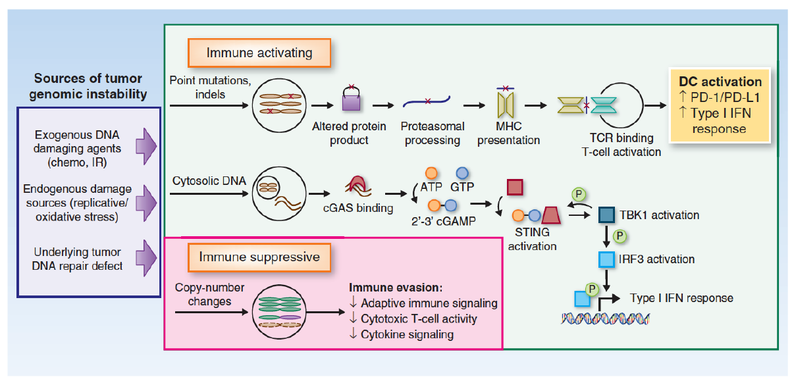Our research
DNA repair pathway alterations are common in tumors, directly contribute to the tumor phenotype, and can drive therapy response and resistance. Our lab's goal is to understand how tumor-specific changes in DNA repair function can be leveraged as biomarkers and therapeutic targets. We have a particular interest in bladder (urothelial) cancer and prostate cancer, but are broadly interested in DNA repair across solid tumor contexts.
DNA repair pathway alterations and bladder cancer biology
Somatic ERCC2 mutations are correlated with cisplatin response in muscle-invasive bladder cancer and are sufficient to drive cisplatin sensitivity in bladder cancer model systems. We are working to understand the functional landscape of ERCC2 mutations and define the scope of ERCC2 as a predictive biomarker in this disease.
DNA repair pathway alterations and bladder cancer biology
Somatic ERCC2 mutations are correlated with cisplatin response in muscle-invasive bladder cancer and are sufficient to drive cisplatin sensitivity in bladder cancer model systems. We are working to understand the functional landscape of ERCC2 mutations and define the scope of ERCC2 as a predictive biomarker in this disease.
Van Allen*, Mouw*, et al. Somatic ERCC2 mutations correlate with cisplatin sensitivity in muscle-invasive bladder cancer. Cancer Discovery 2014; 4:1140
Li*, Damish*, Frazier*, et al. ERCC2 helicase domain mutations confer nucleotide excision repair deficiency and drive cisplatin sensitivity in muscle-invasive bladder cancer. Clinical Cancer Research 2019; 25:977
Li*, Damish*, Frazier*, et al. ERCC2 helicase domain mutations confer nucleotide excision repair deficiency and drive cisplatin sensitivity in muscle-invasive bladder cancer. Clinical Cancer Research 2019; 25:977
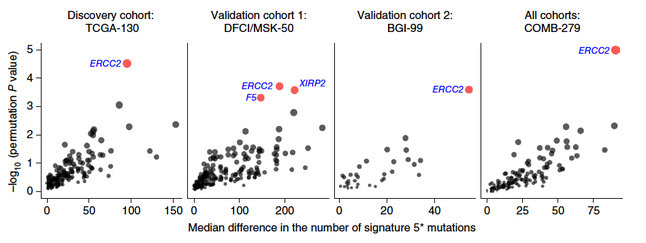
DNA repair pathway alterations and therapeutic sensitivities in prostate cancer
Recent genomic studies have revealed that advanced prostate tumors harbor frequent alterations in DNA damage and repair genes. ATM is a DDR kinase with a central role in coordinating DNA repair and cell cycle following double-strand DNA breaks. ATM alterations are present in ~5% of advanced prostate tumors, but the therapeutic implications of ATM loss or mutation are incompletely understood and several clinical trials suggest that ATM-mutated prostate tumors are less likely to respond to PARP inhibitors than BRCA2-mutated tumors. We created a series of ATM-deficient preclinical models and found that ATM loss does not significantly impact PARP inhibitor sensitivity, but does increase sensitivity to ATR inhibition. We are now working to further define the role of ATM and other DDR gene alterations on prostate tumor biology and drug sensitivity.
Recent genomic studies have revealed that advanced prostate tumors harbor frequent alterations in DNA damage and repair genes. ATM is a DDR kinase with a central role in coordinating DNA repair and cell cycle following double-strand DNA breaks. ATM alterations are present in ~5% of advanced prostate tumors, but the therapeutic implications of ATM loss or mutation are incompletely understood and several clinical trials suggest that ATM-mutated prostate tumors are less likely to respond to PARP inhibitors than BRCA2-mutated tumors. We created a series of ATM-deficient preclinical models and found that ATM loss does not significantly impact PARP inhibitor sensitivity, but does increase sensitivity to ATR inhibition. We are now working to further define the role of ATM and other DDR gene alterations on prostate tumor biology and drug sensitivity.
DNA repair dysfunction and mutational signature processes in cancer
Loss of DNA repair fidelity can lead to distinct mutational patterns in tumor cells. We are working to understand the mechanisms through which DNA repair pathway alterations lead to mutational signatures.
Loss of DNA repair fidelity can lead to distinct mutational patterns in tumor cells. We are working to understand the mechanisms through which DNA repair pathway alterations lead to mutational signatures.
Haradhvala et al. Distinct mutational signatures characterize concurrent loss of polymerase proofreading and mismatch repair. Nature Communications 2018; 9: 1746
Maruvka, Mouw, et al. Analysis of somatic microsatellite indels identifies driver events in human tumors. Nature Biotechnology 2017; 35: 951
Maruvka, Mouw, et al. Analysis of somatic microsatellite indels identifies driver events in human tumors. Nature Biotechnology 2017; 35: 951
Radiation-induced genomic evolution and radiation biomarkers
Radiation is a critical component of curative treatment for many solid tumors. However, tumors vary markedly in their response to radiation. Using a combination of clinical sequencing and cell-based model systems, we are working to understand the genomic features of radiation sensitivity and resistance.
Radiation is a critical component of curative treatment for many solid tumors. However, tumors vary markedly in their response to radiation. Using a combination of clinical sequencing and cell-based model systems, we are working to understand the genomic features of radiation sensitivity and resistance.
DNA repair and immunotherapy
Loss of DNA repair impacts the interaction between the tumor and the immune system, and DNA repair deficiency is a predictor of sensitivity to immune checkpoint blockade in several clinical contexts. We are studying the impact of DNA damage and repair on tumor immune features with the ultimate goal of defining optimal combination approaches for DNA repair-directed therapies and immunotherapies.
Loss of DNA repair impacts the interaction between the tumor and the immune system, and DNA repair deficiency is a predictor of sensitivity to immune checkpoint blockade in several clinical contexts. We are studying the impact of DNA damage and repair on tumor immune features with the ultimate goal of defining optimal combination approaches for DNA repair-directed therapies and immunotherapies.
Mouw et al. DNA damage and repair biomarkers of immunotherapy response. Cancer Discovery 2017. 36: 1710.
Mouw & D'Andrea. DNA repair deficiency and immunotherapy response. Journal of Clinical Oncology 2018; 36:1710.
Nassar, Mouw, et al. A model combining clinical and genomic features to predict to PD-1/PD-L1 blockade in advanced urothelial cancer. British Journal of Cancer 2020; 122; 555.
Mouw & D'Andrea. DNA repair deficiency and immunotherapy response. Journal of Clinical Oncology 2018; 36:1710.
Nassar, Mouw, et al. A model combining clinical and genomic features to predict to PD-1/PD-L1 blockade in advanced urothelial cancer. British Journal of Cancer 2020; 122; 555.

